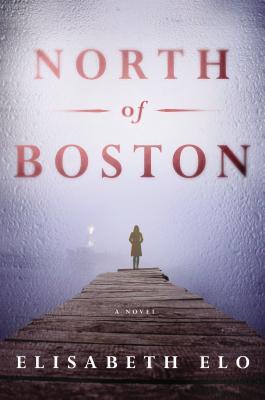Hey everyone! Today I have a great book to share with you all - Elisabeth Elo's newest release NORTH OF BOSTON. Read on to learn more about the book, read a guest post from the author, and don't forget to enter the giveaway at the bottom of the post!
North of Boston
Author: Elisabeth Elo
Genre: Mystery/Thriller
Release Date: January 23, 2014
Publisher: Pamela Dorman Books
Description:
Dennis Lehane meets Smilla’s Sense of Snow:
a big discovery in the world of female suspense, about an edgy young
woman with the rare ability to withstand extreme conditions.
Elisabeth Elo’s debut novel introduces Pirio Kasparov, a Boston-bred tough-talking girl with an acerbic wit and a moral compass that points due north.
When the fishing boat Pirio is on is rammed by a freighter, she finds herself abandoned in the North Atlantic. Somehow, she survives nearly four hours in the water before being rescued by the Coast Guard. But the boat’s owner and her professional fisherman friend, Ned, is not so lucky.
Compelled to look after Noah, the son of the late Ned and her alcoholic prep school friend, Thomasina, Pirio can’t shake the lurking suspicion that the boat’s sinking—and Ned’s death—was no accident. It’s a suspicion seconded by her deeply cynical, autocratic Russian father, who tells her that nothing is ever what it seems. Then the navy reaches out to her to participate in research on human survival in dangerously cold temperatures.
With the help of a curious journalist named Russell Parnell, Pirio begins unraveling a lethal plot involving the glacial whaling grounds off Baffin Island. In a narrow inlet in the arctic tundra, Pirio confronts her ultimate challenge: to trust herself.
A gripping literary thriller, North of Boston combines the atmospheric chills of Jussi Adler-Olsen with the gritty mystery of Laura Lippman. And Pirio Kasparov is a gutsy, compellingly damaged heroine with many adventures ahead.
Elisabeth Elo’s debut novel introduces Pirio Kasparov, a Boston-bred tough-talking girl with an acerbic wit and a moral compass that points due north.
When the fishing boat Pirio is on is rammed by a freighter, she finds herself abandoned in the North Atlantic. Somehow, she survives nearly four hours in the water before being rescued by the Coast Guard. But the boat’s owner and her professional fisherman friend, Ned, is not so lucky.
Compelled to look after Noah, the son of the late Ned and her alcoholic prep school friend, Thomasina, Pirio can’t shake the lurking suspicion that the boat’s sinking—and Ned’s death—was no accident. It’s a suspicion seconded by her deeply cynical, autocratic Russian father, who tells her that nothing is ever what it seems. Then the navy reaches out to her to participate in research on human survival in dangerously cold temperatures.
With the help of a curious journalist named Russell Parnell, Pirio begins unraveling a lethal plot involving the glacial whaling grounds off Baffin Island. In a narrow inlet in the arctic tundra, Pirio confronts her ultimate challenge: to trust herself.
A gripping literary thriller, North of Boston combines the atmospheric chills of Jussi Adler-Olsen with the gritty mystery of Laura Lippman. And Pirio Kasparov is a gutsy, compellingly damaged heroine with many adventures ahead.
Guest Blog: Why We Love Survival Stories
by Elisabeth Elo, author of North of Boston
Type “survival stories” into your browser and watch as numerous tales pop up – everything from the man who rode a tornado (Matt Suter in 2006) to the father/son team who surfed a mega-tsunami in their fishing boat (Howard and Sonny Ulrich in 1958). There are stories of wilderness survival, in which people display incredible stamina and resourcefulness; stories of indomitable will in the face of horrifying inhumanity; stories of brute strength, of perseverance, of dumb luck and amazing ingenuity. Just recently the New York Times featured John Aldredge, a fisherman who fell overboard at 3:30 am 40 miles off the tip of Long Island. He trapped air in his rubber boots, tucked them under his armpits, and slowly navigated his way from one distant buoy to another to bring himself nearer to the likely search area. After rescue, he modestly acknowledged, “I did my part.”
We treasure these stories; we discuss them endlessly. On some level, we need them. Why?
Perhaps we need look no further than the fact that we are biological organisms. Like other life forms – viruses, hedgehogs, gorillas -- our first business is continuing to exist. Sure, we need to live long enough to pass on our DNA, but even after we have produced offspring we tend to remain hell-bent on seeing tomorrow. A propulsive energy drives us into the future. That “life force” is at the root of our identity. We are “meant” to survive.
So, how do life forms survive? Evolutionists give a one-word answer: adaptation. This is where things get interesting. I have no idea how rudimentary organisms adapt: it
probably has something to do with enzymes, food sources, and a hundred other things. But I have a fair idea of what humans do to adapt, and that has a lot to do with brain functions such as intelligence, ingenuity, perseverance, psychological acuity, and hope (shorthand for a chronic mental attitude that says, “Well, that didn’t work, so I guess I’ll try something else tomorrow.”) When you make a list of human adaptive strategies, you come pretty close to defining what it means to be a human being.
I think this is why we love survival stories. They bring us down to our most basic biological imperative, while connecting us to the most essential and exalted parts of our unique humanity.
It ought to come as no surprise, then, to learn that the first survival novel ever written, Daniel Defoe’s Robinson Crusoe (also one of the first novels ever written), was an international blockbuster hit. Said to be based on a true account, Defoe’s tale of a plucky island castaway quickly went through four printings. It was translated into dozens of languages, some as obscure as Inuktitut and Coptic, and by the end of the nineteenth century, it is said to have spawned more imitations (or, shall we say, inspired more artists) than any other work of western literature. Today, it would be hard to find a westerner over the age of twelve who is unfamiliar with the hero’s name. (In addition to being wildly popular, Robinson Crusoe had an important artistic influence. According to some literary critics, its publication in 1719 marked the birth of “realism.”)
After Robinson Crusoe, novels about survival proliferated, and movies soon capitalized on the plot. There is no sign of this interest abating. Look around. We’ve got everything from reality survivor shows, to true survivor stories, to stories “based on a true account,” to “this actually could happen” stories, to “this would never really happen but who
cares” stories. My safe bet is that the survival plot will never go out of fashion. The situations depicted may (and do) change, but the basic concept of a man or woman using his or her wits, determination, and courage to overcome an overwhelming threat will always have an almost mesmerizing effect on us -- at least on those of us who are not yet safe and comfortable, who still feel close to the jaws of the beast. And that, I think, is mostly everyone.

(Photo taken from Goodreads)
Author Links:
Website: http://elisabethelo.com/
Facebook: https://www.facebook.com/elisabetheloauthor
Twitter: https://twitter.com/ElisabethElo1
Goodreads: https://www.goodreads.com/author/show/7135867.Elisabeth_Elo
Pinterest: http://www.pinterest.com/elisabethelo/places-and-images-from-the-novel-north-of-boston/
Giveaway: The wonderful people at Pamela Dorman books are allowing me to give away (1) hardcover copy of NORTH OF BOSTON to a lucky follower! US only!





No comments:
Post a Comment